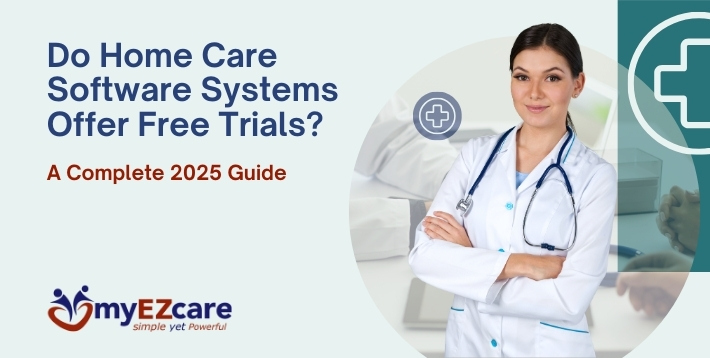Exploring new home care software often starts with a simple question that agency owners ask every day: whether home care software companies offer free trials. Testing a platform before adopting it can make a major difference, especially when scheduling, documentation, billing, payroll, and compliance depend on the system working smoothly. A trial allows agencies to understand whether the software truly fits their operations and whether the staff can comfortably use it.
Many home care software companies offer some form of trial, demo, or guided access. These experiences vary in structure, but their purpose is the same. Agencies want clarity before making a long-term decision. A trial lets administrators and caregivers understand the workflow, test features, and evaluate whether the platform will help the agency work more efficiently. This blog explains how free trials typically work, which popular companies offer them, and what agencies should expect during the evaluation process.

Why Free Trials Matter When Choosing Home Care Software
Switching software is a significant decision for any agency. The system you choose will impact daily operations, documentation accuracy, financial workflows, and staff communication. Free trials help agencies experience the interface firsthand. They reveal whether the software is simple, logical, and strong enough to support real-world demands.
A trial also gives agencies a chance to understand how well the system connects daily tasks. For example, home care software that links scheduling, documentation, payroll, and billing helps reduce double work and improve accuracy. Agencies often learn these benefits more clearly during a hands-on experience than through product descriptions.
Do Home Care Software Platforms Offer Free Trials?
The short answer is yes. Many home care platforms offer some form of trial or structured preview. However, the type of trial depends on the company’s approach, the complexity of the system, and the needs of the agency.
Some platforms give full access for a limited period. Others provide guided demonstrations where a team member walks users through the interface. Some offer a combination of both, allowing agencies to explore features independently after an initial walkthrough.
Free trials give agencies the opportunity to test the workflow, see how caregivers clock in, understand how documentation flows into reports, and evaluate whether the system feels natural for their team.
Free Trial Approaches Used by Popular Home Care Software Providers
myEZcare
myEZcare, allows agencies to explore the platform through a guided, hands-on experience designed to help users understand scheduling, documentation, timekeeping, billing, and payroll. This type of structured access helps teams see how well the connected workflow performs and how it may simplify day-to-day tasks.
ClearCare (WellSky Personal Care)
ClearCare generally offers trial access through guided product demonstrations. Agencies see how scheduling, caregiver management, and admin features work while receiving support from their team.
AxisCare
AxisCare typically provides access through an onboarding-style session. Administrators can preview essential features such as visit tracking, scheduling, and communication tools.
CareSmartz360
CareSmartz360 often offers a trial environment that lets agencies explore essential features with assistance. This helps teams understand how the platform manages multi-payer billing, client records, and caregiver workflows.
AlayaCare
AlayaCare usually takes a structured demo-first approach because of its advanced capabilities. Agencies see how clinical documentation, analytics, and care coordination tools operate within the platform.
During these trials, agencies learn which platforms feel simpler, which offer stronger integrations, and which fit their operational preferences.
What Agencies Learn During a Free Trial:
Ease of Use and Learning Curve
A trial shows how quickly caregivers and administrators can understand the software. If the system feels intuitive, agencies experience fewer errors and shorter training periods.
Accuracy and Workflow Quality
Trials help agencies understand how well the software supports daily operations. They can test scheduling, documentation, and billing sequences to see if everything feels seamless.
Team Feedback and Adoption
Team reactions matter. During trials, administrators can observe whether staff are comfortable using the system or whether confusion slows them down.
Integration With Daily Tasks
Trials reveal whether features flow naturally. Agencies learn how scheduling updates affect payroll, how documentation supports billing, and whether communication tools feel useful.
How to Make the Most of a Free Home Care Software Trial
To fully benefit from a trial, agencies should test the software with real scenarios. Caregivers can try clocking in, completing notes, and reviewing schedules. Administrators can generate reports, experiment with billing, or review documentation.
Real tasks highlight strengths and expose weaknesses. They help teams make confident decisions.
Conclusion
Free trials offer agencies valuable insight into whether a software system fits their needs. Even though each provider offers trials differently, the goal is the same. Agencies want clarity. They want to understand whether the platform is easy to use, supports accurate workflows, and fits comfortably into their operations. With proper evaluation, a free trial can guide agencies toward choosing the right long-term system. Whether exploring options or beginning digital transformation, platforms like myEZcare play an important role in helping agencies understand what modern home care systems can offer.
FAQs
Do all home care software companies offer free trials?
Most offer either a limited free trial, a guided demo, or a short-term preview depending on the platform’s complexity.
What is the difference between a trial and a demo?
A trial allows hands-on use, while a demo is a guided walkthrough with a product specialist.
How long do free trials usually last?
Trial lengths vary across companies. Some offer a few days, while others provide structured access over a week.
Can caregivers test the software during the trial?
Yes. Agencies are encouraged to let caregivers try tasks such as clocking in, completing notes, and checking schedules.
What should I evaluate during a trial?
Ease of use, accuracy of workflows, documentation quality, team comfort, and how well the platform supports real tasks.

